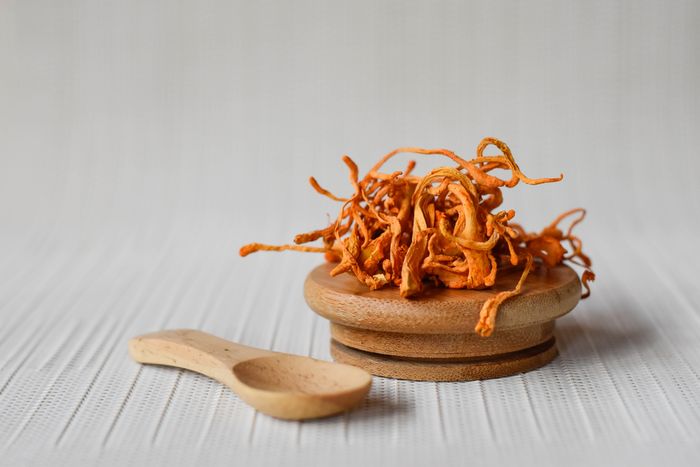Cordyceps Militaris: Risk Factors & 5 Potential Side Effects
Updated September 20, 2023.

Cordyceps militaris is a species of fungi that, like many other mushrooms, has been gaining popularity as an effective traditional medicine. It is often referenced for its supposed ability to treat several health conditions ranging from chronic respiratory disorders to organ disorders and even for low libido.
However, not many people seem to talk about the potential risks or side effects of Cordyceps mushrooms. And, while they appear to be safe for regular consumption, what possible side effects are there?
1. Cordyceps May Cause Hypoglycemia
A study published on The National Center for Biotechnology Information found that fruiting bodies of Cordyceps lowered blood-glucose levels in rats that suffered from high-fat diet-induced diabetes.
This result comes with its host of positives and negatives as it suggests a potential natural remedy for diabetes in the future and a likely weight loss side effect of Cordyceps.
However, it also means that diabetics who are already on medications to reduce blood sugar levels could experience hypoglycemia (dangerously low blood sugar) if they use Cordyceps. This can lead to several symptoms, such as confusion, heart palpitations, and anxiety.
2. Cordyceps May Decrease Blood Clotting
Similar to the potential positive and negative effects of Cordyceps and blood sugar, some studies have noted the potential antiplatelet effect of these mushrooms. Essentially, this means that Cordyceps can reduce the ability of your blood to clot. While this could be beneficial for those at risk for acute pulmonary embolisms (blood clots and blockages in the arteries of the lungs) and other clotting-related disorders like heart attacks, it could be dangerous in those who are already on blood-thinning medication.
The combination of blood-thinners and Cordyceps might lead to increased bruising and bleeding.
3. Cordyceps May Cause Gastrointestinal Problems
Although this risk is still rare, the most commonly reported side effect of Cordyceps is gastrointestinal problems. The chance of this side effect is reportedly low in normal and healthy individuals, but it suggests that Cordyceps could cause symptoms such as nausea, vomiting, and an upset stomach.
4. Cordyceps May Increase Myelogenous Cancer Precursors
One of the significant proclaimed benefits of Cordyceps is its anti-tumour properties and ability to enhance the efficacy of cancer treatments. However, somewhat contrarily, experts warn against using this fungus to combat one specific type of cancer: myelogenous leukemia.
This type of cancer is uncommon and begins in the bone marrow, the birthplace of stem cells and progenitor cells. In short, it originates from a mutated chromosome that causes too many white blood cells to grow and then refuse to die as they should. This leads to a build-up of diseased, cancerous cells that can damage the bone marrow.
Cordyceps has been associated with the growth of progenitor cells in some studies, and so could potentially increase the effect and progression of myelogenous cancer.
5. Cordyceps May Worsen Autoimmune Diseases
Cordyceps is often touted for its potential immune-boosting capabilities, as is the case with many functional mushrooms. This is a substantial benefit in most cases, but it can also be dangerous for certain individuals who suffer from autoimmune diseases like rheumatoid arthritis (RA) and Lupus.
An autoimmune disease causes an overactive immune system that is unable to differentiate healthy cells from dangerous cells. In the case of RA, the immune cells attack the healthy tissue inside the joints. Since Cordyceps can activate the immune system, it can be dangerous when taken with an autoimmune disease.
Who Is at Risk for Cordyceps Side Effects?
To summarise the above factors, those who should be immediately wary of taking Cordyceps are those who:
- Take medications that reduce blood sugar levels.
- Are on blood thinners, or who have bleeding disorders.
- Are expecting surgery soon.
- Have mushroom or mould allergies. Cordyceps is a fungus, and so individuals could be at risk for allergic reactions.
- Suffer from myelogenous cancers.
- Suffer from autoimmune diseases.
Aside from that, there isn't much research on the safety of Cordyceps in pregnant women and breastfeeding mothers, and so these groups should exercise caution and avoid such fungi.
Is Cordyceps Militaris Safe?
Although this article may be fear-inspiring, all the listed side effects are extreme examples of severe and unusual cases. In fact, it is commonly believed and understood that Cordyceps fruiting bodies, dried extracts, and tinctures are safe when taken every day for up to a year. Additionally, the benefits seem to outweigh the cons.
What is not a common side effect of cordyceps is sleep problems if taken at night or before bed, and they won't cause anxiety either.
If you have any concerns, it is recommended that you consult with a doctor first. However, so long as you aren't one of the individuals who are notably at risk for the side effects of Cordyceps, it is likely safe for the average person.









